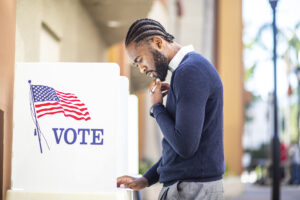A Supreme Court battle over new congressional maps created by Republicans in Louisiana is questioning who is a Black voter.
NPR reports the maps, which were created after the 2020 Census, and the fate of the maps rests with the High Court’s decision in Merrill v. Milligan, which could set a precedent for future lawsuits concerning Section 2 of the Voting Rights Act.
Lower courts in cases in both Alabama and Louisiana determined the maps were drawn in a way that discriminated against Black voters, a violation of Section 2 Voting Rights Act giving minority groups “less opportunity than other members of the electorate to participate in the political process and to elect representatives of their choice.”
However, GOP officials in both states pushed back against the findings by questioning the definition of Blackness that has been the standard in cases focused on Black America’s voting power.
According to a 2003 Supreme Court ruling, the definition of “Black” includes every person who identifies as Black on census forms including people who identify as Black and any other race such as White, Asian or Latino.
Republican officials in Alabama are now calling for a narrower definition of what qualifies as a Black voter that does not include people who also identify with another race. They’ve argued in lower court filings that limiting the definition to those who just mark the “Black” on census forms and do not identify as Latino would be the “most defensible.”
In the Louisiana case, Ardoin v. Robinson, Republican officials argued for the definition to only include those who check just the Black box or both Black and White and do not identify as Latino.
Alabama dropped its push to redefine Blackness before appealing to the Supreme Court, but Republicans in the Louisiana including Secretary of State Kyle Ardoin, have asked the High Court to weigh in on which definition should be used in future Section 2 cases.
The situation is reminiscent of other tactics Southern states have used, including Jim Crow laws and current election restriction bills to suppress Black voters.
If the High Court rules in Louisiana’s favor, it could make it nearly impossible to use Section 2 of the Voting Rights Act to challenge district maps in the future.
Redistricting experts told NPR who counts as a Black voter in district maps has not been up for debate since the 2003 ruling.
“It was thought to be settled,” Morgan Kousser, professor emeritus of history and social science at the California Institute of Technology, told NPR.
In Louisiana, however, Republican state officials say the 2003 case heard by the Supreme Court, which deals with Section 5 of the Voting Rights Act, shouldn’t apply to Section 2 and that a narrower definition of who a Black voter is would “prevent state actors from artificially inflating the minority counts of their redistricting plans.”
Both arguments failed in lower courts.











Comments